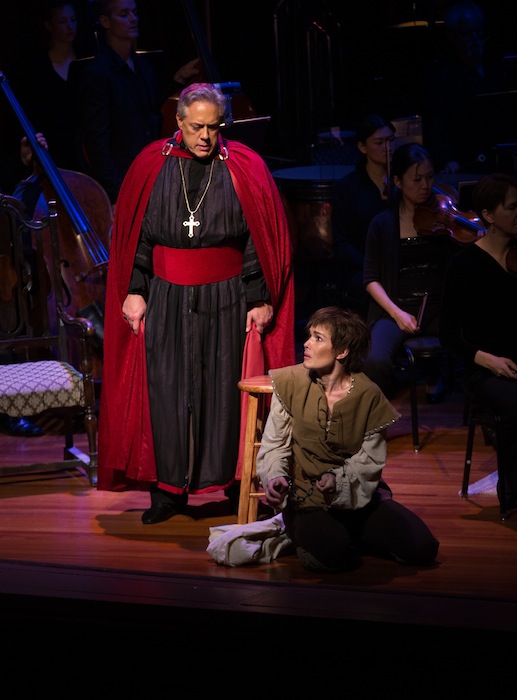Odyssey Opera unearths musical treasure with Dello Joio’s “The Trial at Rouen”

Heather Buck and Stephen Powell in Norman Dello Joio’s “The Trial at Rouen” presented by Odyssey Opera Friday night at Jordan Hall. Photo: Kathy Wittman
No story fired Norman Dello Joio’s imagination quite like that of Joan of Arc. Like many before him, the American composer turned to the subject for an opera. And though his first attempt, The Triumph of St. Joan, was well received, the composer declined to have it performed after its premiere in 1951.
But he was still drawn to the saga of the maid from Orleans and wrote an entirely new work for television, The Trial at Rouen,which focuses on the end of her short yet heroic life. Following the work’s NBC premiere in April of 1956, however, the piece quickly fell into obscurity.
Until Friday night at Jordan Hall, that is, when Odyssey Opera teamed up with the Boston Modern Orchestra Project to present the stage premiere of Dello Joio’s forgotten take on Joan’s story. Gil Rose led the way.
The Trial at Rouen focuses on the last hours of Joan’s life. She has been captured by the Burgundians, and while awaiting trial she is visited by Father Julien, who pleads for her to confess that the voices she hears are those of the devil so that she may live. Joan is defiant but ultimately torn. At the trial, under threat of execution from Bishop Pierre Cauchon, she relents and confesses. But a final vision from heaven convinces her to testify to the truth, and she boldly proclaims to the bishop, “Light the fire.”
Dello Joio’s libretto explores two warring visions of Christianity. One, represented by Cauchon, is the unbending establishment of the medieval Catholic Church, where heresy results in death. The other is Joan’s equally powerful and convincing faith driven by a personal relationship with God that looks ahead to the Reformation. Caught between these competing visions is the fate of the young maid. Should she confess and live, or die for her own vision? Dello Joio’s opera poses the timeless question: What does it truly mean to be free?
The music communicates Joan’s story into a poignant human drama. The composer’s style is thoroughly lyrical, and the music is shot through with melodies that recall both chant and traditional Italian opera. The harmonic writing unfolds smooth consonances into thorny dissonance and back again in a style similar to Dello Joio’s teacher, Hindemith.
But the score is also richly dramatic. Blazing cluster chords accompany Joan’s defiance, and warm, melodic lines reflect the solace of the sympathetic Father Julien. The final scene, which sees Joan looking forward to her death, was hauntingly beautiful.
The singers for this semi-staged production were consistently excellent.
Through her singing and acting Heather Buck fully captured Joan’s plight. The soprano sang with ringing intensity, and her upper range flowered elegantly. The aria she sings to the dress, which represents the subordination of Joan’s will, resonated with a sweet sorrow. In the final scene, Buck’s bright and shimmering tone made Joan’s emotions palpable as she went to her death with an earth-weary confidence.
As Pierre Cauchon, Stephen Powell sang with a strong, cavernous voice that had just the right touch of darkness to bring out the character’s stubborn hostility. Yet he, like Joan, is also convinced of his own religious righteousness, and Act 2 prayer rang with conviction.
Luke Scott, as Father Julien, sounded with a touch of avuncular warmth as he pleaded with Joan to confess and with Cauchon to soften his stance. The remaining cast, Ryan Stoll as the jailer, and Jeremy Ayres Fisher as the soldier, sang with strength and grace. The Inquisitors, drawn from Odyssey Opera’s fine chorus and staged on the left balcony, supplied powerful singing in the trial scene. And the chorus, prepared by Mariah Wilson, sang with beaming tone and crystal clear diction when called upon.
Props were minimal in this spare production. A small cot was enough to transform stage right into a jail cell, and a chair and stool were all that was needed for Joan’s trial. The period costumes and tasteful lighting supplied a splash of color to the stage.
Rose drew sensitive and warmly lyrical playing from the orchestra in support. The string sound was radiant, and the brass and winds wrapped the soloists in soft blankets of sound.
The same could be said of the concert’s opener, Dello Joio’s The Triumph of St. Joan Symphony, which the composer crafted from his original opera on the subject.
Cast in three movements, the work captures the essence of the French heroine. “The Maid” flows in soft, chant-like lines, “The Warrior” builds to martial exuberance, and “The Saint” ends in sounds of prayerful light. Rose and the orchestra gave the piece a reading of stirring energy and delicacy.
Odyssey Opera will present Honegger’s Jeanne d’Arc au Bûcher 7:30 p.m. February 17 at Sanders Theatre. odysseyopera.org
Posted in Performances



